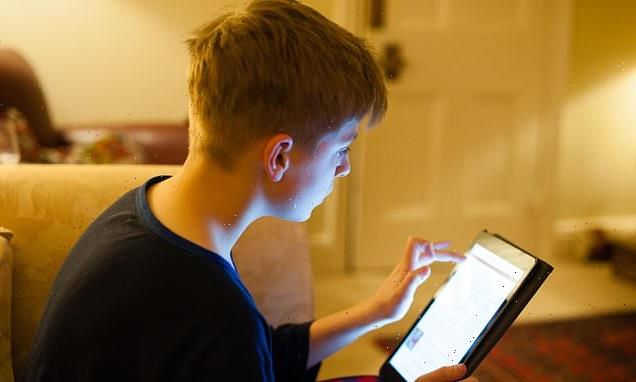
Nine ways you can keep your children safe online right now WITHOUT them hating you, according to three cybersecurity experts
- DailyMail.com asked cyber security, child safety experts about best practices
- Tips include how to block YouTube from every device in your home
- READ MORE: Dangers of ‘smart’ devices like doorbells and thermostats
It is never too early to have conversations about internet safety with your children, with even under-fives accessing services such as YouTube.
So how do you keep children safe from harmful websites, and potential predators – without making the children angry (or worse, inspiring them to use technology in secret)?
DailyMail.com spoke to three experts on tips to keep children safe while browsing – without seeming like a ‘bad parent’.
They all agree that communication is key: open dialogue between parents and children about online issues is central to keeping children safe, rather than taking away devices or other harsh measures.
Do you know what your children are browsing online? (Alamy)
Use apps to keep devices safe
Common security software offers functions which can help to keep your children safe online – monitoring which sites they visit.
Tasha Gibson, Security lead, at RM Technology, which specialises in protecting schools says, ‘Parents and guardians have the ability to install sophisticated security software that gives even further control
Gibson recommends parents try antivirus software, from known brands such as Norton and Kaspersky, to dedicated apps including FamilyTime and Canopy.
FamilyTime, for example, offers YouTube monitoring, an app blocker, screen time limits and a watchlist for contacts which can prevent certain numbers from getting in touch.
Lock apps you don’t want your children looking in
Every frazzled parent has handed over their handset to children to keep them quiet in restaurants – but you might not want your child able to access a browser, or YouTube or your personal files.
Here’s why you should never let children use an iPad alone
Tom Gaffney, cyber security specialist at F-Secure, says you can pause apps to stop children accessing them.
On iOS you can do this via the Screen Time controls in Settings – on Android, you can do it by holding a finger on an app widget and tapping the hourglass icon.
Gaffney says, ‘One way to stop a child accidentally accessing apps you don’t want them to is by freezing the app, so that when they try to click on it, it doesn’t allow them to.’
Block sites like YouTube at the router level
Most home broadband routers will let you block websites entirely – meaning that they can’t be accessed even if children are on devices without security software.
Tasha Gibson, Security lead, at RM Technology says, ‘You can block specific URLs at the source (router) to prevent any access to ultimately protect your children from harmful or inappropriate content . ‘
How to do this will depend on the specific router model you are using.
Gibson says, ‘It’s pretty basic to do as needed but often achieved via some of the software platforms mentioned already.’
Use built-in controls
Parents can use built-in controls in iOS and Android to limit screen time and limit when devices can be used.
Gibson says, ‘Users are able to apply limitations to children’s profiles through tools such as the Amazon Parents Dashboard and iOS control centre to manage time and access at all times.
You can use parental controls to limit what children can see: on iOS for example, go to
Settings and tap Screen Time. Tap Content & Privacy Restrictions, then tap Content Restrictions.
You can set restrictions for everything from video to podcasts from this screen.
Have rules for where devices can be used
Having rules for where devices such as iPads and PCs can be used helps to ensure children use devices safely.
Gibson says, ‘Set rules and boundaries as a family for online use, for example – what times they can be used, for how long and ensuring use of screens and devices in areas where you can see monitor usage.’
Block app installations
If you know what apps your children are using, you can be certain they’re not (for example) using a messaging app you don’t know about.
Set your OS to require a password or biometric authentication (ie a fingerprint) every time an app is installed.
On iOS for example, make sure iTunes & App Store is turned on under Settings > Touch ID & Passcode to lock app installs behind a fingerprint requirement.
Gibson says, ‘Restrict the ability for your child to install Apps without seeking the permission of a parent or guardian via iOS or Google Play so you can be aware of what Apps they are using.’
Don’t assume your children know how to use technology
Young people tend to have a ‘natural’ technological aptitude, but don’t make the mistake of assuming they understand online risk.
David Emm, Principal Security Research at Kaspersky says, ‘When you teach a child how to ride a bike, you also teach them the rules of the road.
‘The same applies to the online world – device knowledge is one thing, what you can do with it is something totally different. Educating a child about the true power of a device will help them understand the risks.’
Play the games your children are using
It can be difficult to get to grips with the risks your children face without understanding the software they use – for example, you can see if there’s a chat function which could lead them to talking to people they don’t know.
Emm says, ‘It is a lot easier if you are aware of the dangers yourself! So, take a bit of time to get clued up on the latest apps and games that they have access to – and yes, this might mean that you need to play a bit of Minecraft or Roblox but it will give you a better idea of where your kids are spending their time!’
Teach children to be careful with private data
For children, it’s all too easy to give away data which could be used in identity fraud attacks – so teach them to be more careful online.
Emm says, ‘Oversharing is dangerous. Answering an online quiz about your first pets name and where you live might sound like harmless fun, but it’s vital information that can be turned on them and lead to hacked accounts.’
Source: Read Full Article

